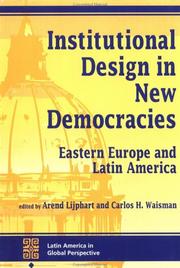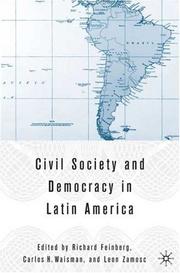| Listing 1 - 10 of 13 | << page >> |
Sort by
|
Book
ISBN: 0691022666 0691633630 1400858852 0691604568 9781400858859 9780691633633 Year: 1987 Publisher: Princeton Unversity press
Abstract | Keywords | Export | Availability | Bookmark
 Loading...
Loading...Choose an application
- Reference Manager
- EndNote
- RefWorks (Direct export to RefWorks)
Carlos Waisman has pinpointed the specific beliefs that led the Peronists unwittingly to transform their country from a relatively prosperous land of recent settlement, like Australia and Canada, to an impoverished and underdeveloped society resembling the rest of Latin America.Originally published in 1987.The Princeton Legacy Library uses the latest print-on-demand technology to again make available previously out-of-print books from the distinguished backlist of Princeton University Press. These editions preserve the original texts of these important books while presenting them in durable paperback and hardcover editions. The goal of the Princeton Legacy Library is to vastly increase access to the rich scholarly heritage found in the thousands of books published by Princeton University Press since its founding in 1905.
Book
ISBN: 029275065X 0292769474 Year: 1982 Publisher: Austin, Tex. University of Texas Press
Abstract | Keywords | Export | Availability | Bookmark
 Loading...
Loading...Choose an application
- Reference Manager
- EndNote
- RefWorks (Direct export to RefWorks)
Social stratification --- Social change --- Political sociology
Book
ISBN: 9780292769472 Year: 2021 Publisher: Austin
Abstract | Keywords | Export | Availability | Bookmark
 Loading...
Loading...Choose an application
- Reference Manager
- EndNote
- RefWorks (Direct export to RefWorks)
Multi
ISBN: 9780292769472 Year: 2021 Publisher: Austin, Tex. University of Texas Press
Abstract | Keywords | Export | Availability | Bookmark
 Loading...
Loading...Choose an application
- Reference Manager
- EndNote
- RefWorks (Direct export to RefWorks)

ISBN: 0813321093 0813321085 Year: 1996 Publisher: Boulder, Colo. Westview
Abstract | Keywords | Export | Availability | Bookmark
 Loading...
Loading...Choose an application
- Reference Manager
- EndNote
- RefWorks (Direct export to RefWorks)
Government --- Political systems --- Economic order --- Latin America --- Eastern and Central Europe --- Comparative government. --- Institutions politiques comparées --- Europe, Central --- Europe, Eastern --- Europe centrale --- Europe de l'Est --- Amérique latine --- Economic policy. --- Politics and government --- Economic policy --- Politique économique --- Politique et gouvernement --- New democracies --- Institutions politiques comparées --- Amérique latine --- Politique économique
Book
ISBN: 9781403972286 Year: 2006 Publisher: New York, N.Y. Palgrave Macmillan
Abstract | Keywords | Export | Availability | Bookmark
 Loading...
Loading...Choose an application
- Reference Manager
- EndNote
- RefWorks (Direct export to RefWorks)
Community organization --- Internal politics --- Latin America

ISBN: 1403972281 1349533564 9786611369866 1281369861 1403983240 Year: 2006 Publisher: New York : Palgrave Macmillan,
Abstract | Keywords | Export | Availability | Bookmark
 Loading...
Loading...Choose an application
- Reference Manager
- EndNote
- RefWorks (Direct export to RefWorks)
A dense web of private associations drawn from multiple social classes, interest groups and value communities makes for a firm foundation for strong democracy. In Latin America today, will civil society improve the quality of democracy or will it foster political polarization and reverse recent progress? Distinguished theorists from the United States, Canada and Latin America explore the diverse impact of civil society on economic performance, political parties, and state institutions. In-depth and up-to-date country studies explore the consequences of civil society for the durability of democracy in three highly dynamic, controversial settings: Argentina, Brazil and Venezuela.
Civil society --- Democracy --- Société civile --- Démocratie --- Latin America --- Amérique latine --- Politics and government --- Politique et gouvernement --- Société civile --- Démocratie --- Amérique latine --- Ethnology --- Diplomacy. --- International relations. --- Democracy. --- Latin American Politics. --- Latin American Culture. --- International Relations. --- Politics and gover.
Book

ISBN: 9781685857127 Year: 2022 Publisher: Boulder
Abstract | Keywords | Export | Availability | Bookmark
 Loading...
Loading...Choose an application
- Reference Manager
- EndNote
- RefWorks (Direct export to RefWorks)
Multi

ISBN: 9781685857127 Year: 2022 Publisher: Boulder Lynne Rienner Publishers
Abstract | Keywords | Export | Availability | Bookmark
 Loading...
Loading...Choose an application
- Reference Manager
- EndNote
- RefWorks (Direct export to RefWorks)
Book

ISBN: 9781685851941 1685851940 Year: 2023 Publisher: Boulder
Abstract | Keywords | Export | Availability | Bookmark
 Loading...
Loading...Choose an application
- Reference Manager
- EndNote
- RefWorks (Direct export to RefWorks)
Extensively revised since the first edition was published in 1989, this analytically balanced and empirically rich volume thoroughly examines the historical, cultural, social, economic, political, and international factors that affect both the prospects for and the nature of political democracy in Latin America. The book reflects improvements in democratic trends in some countries, but also the erosion of democratic advances in others, with substantial malaise regarding key political actors and institutions and continuing concerns about the impact on democratic consolidation of economic constraints, weak states, judicial inefficacy, and high degrees of inequality. A comprehensive introduction precedes the nine country chapters, which follow a similar format to facilitate comparisons.
| Listing 1 - 10 of 13 | << page >> |
Sort by
|

 Search
Search Feedback
Feedback About UniCat
About UniCat  Help
Help News
News